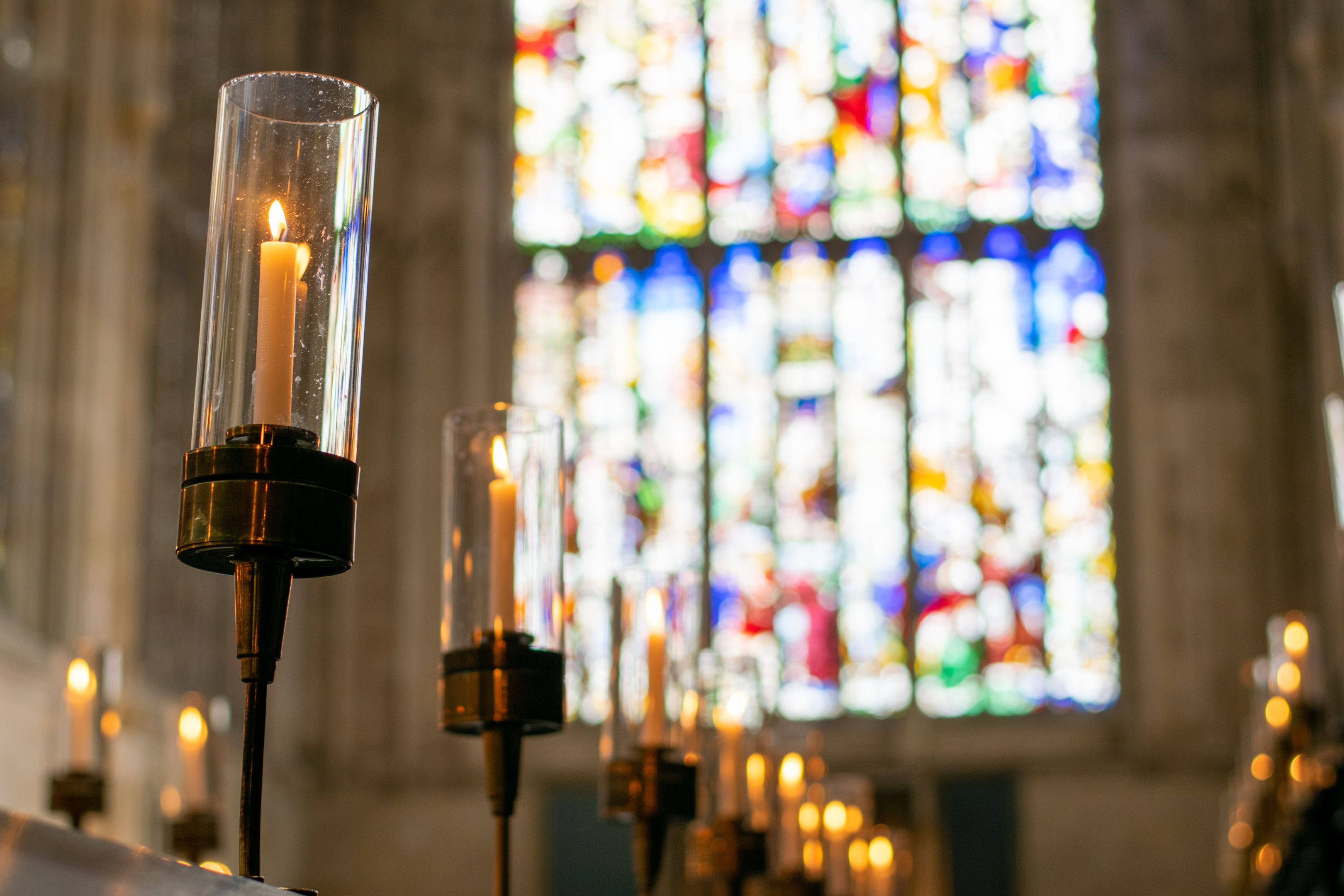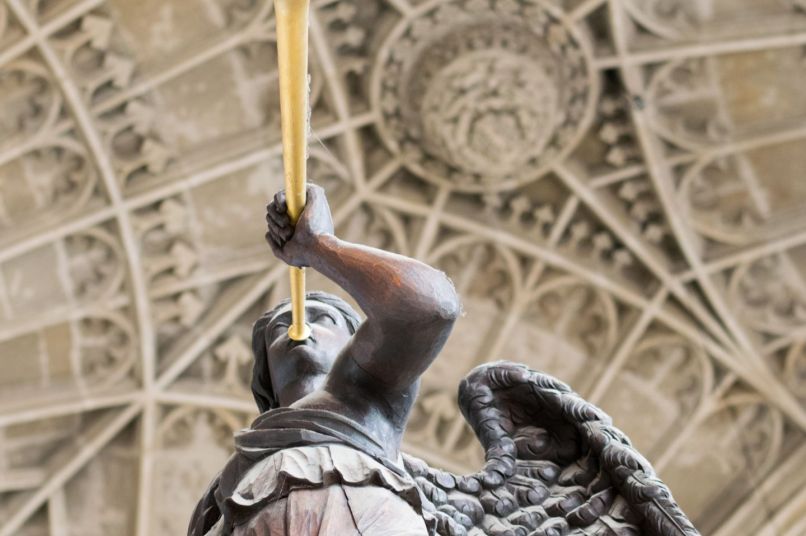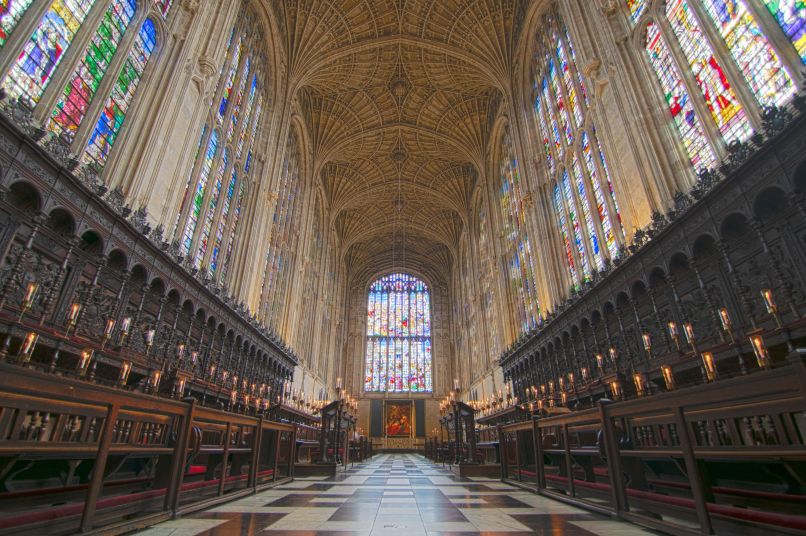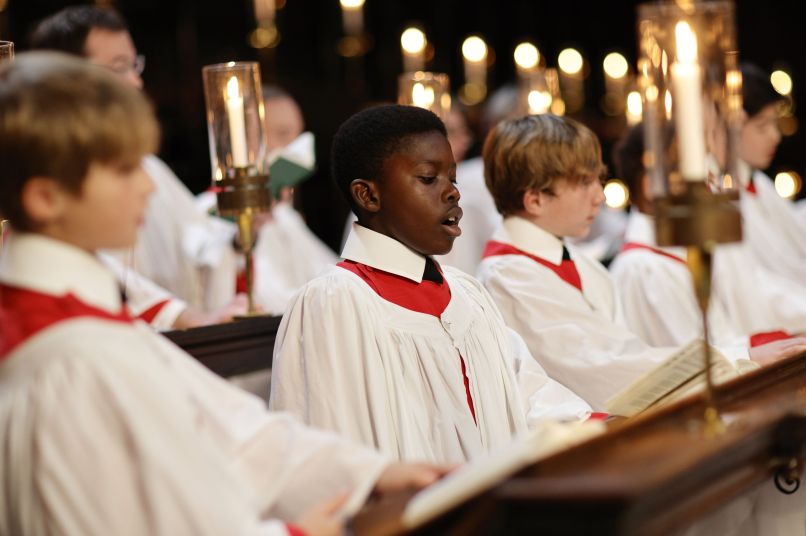

Attend Chapel Services
All are welcome to attend our Chapel services, which are free and open to visitors and College members alike
Chapel Services Calendar
Select a day to view service details

Explore the music and liturgy of Chapel services
Click the link below for the current services booklet :
Chapel Services booklet, Lent Term 2026 (PDF)

About Chapel Services
A wide range of people come to services in King's College Chapel for a variety of reasons, whether to engage in worship, to have some time out from the pressures of everyday life, or to appreciate the building and music in an unhurried way that brings some personal peace and refreshment.
Some of those who attend are local and visit the Chapel regularly, but there are many who are visiting us from afar, and who may only ever be here once. Some are devout Christians, some members of others faiths, some agnostic and some atheists. All are most welcome.
The Reverend Dr Stephen Cherry
Dean of Chapel

What kind of Chapel services are held at King's?
Evensong
Evensong is an opportunity for daily peace and spiritual enrichment; the emphasis is on meditative recitation and reading. It is typically held 6 days a week during term time.
Evensong offers a broad invitation to members of the congregation to listen but there is always an opportunity to say the Creed together, to add an ‘Amen’ after the spoken prayers and to say the words of the Grace. At weekends and on special days we sing hymns, the members of the Choir wear red cassocks, and there is a more celebratory feel to the service. But we never move away from the central spirit, which is to give praise to God and receive refreshment for our souls.
The Psalms are particularly prominent and important, but the heart of the service comes with the two readings, each of which is followed by one of the canticles from Luke’s Gospel: Magnificat and Nunc dimittis, respectively. The Anthem, which precedes the prayers, usually sets words from the Bible or a spiritual poem. On Sundays, Evensong begins with a hymn and the Bidding leads into the General Confession and Absolution, an opportunity to remember our shortcomings and our reliance on God’s grace and not our own goodness. The service ends with a hymn followed by a final prayer and blessing from the high altar.
Holy Eucharist
The Holy Eucharist services are typically held on Sundays and Thursdays during term time. On Saints’ Days and other Festivals, incense may be used at the Holy Eucharist.
Services last between 45 minutes and 75 minutes. A member of staff will be able to advise you and suggest where to sit if you may need to leave early.
Since earliest times, Christians have shared bread and wine in obedience to Jesus’ instruction at the Last Supper: ‘do this in remembrance of me’. They have celebrated Communion informally and formally, in quiet speech and with every conceivable kind of musical embellishment.
In this Chapel we offer the Eucharist in a way that has developed over the years, and which still evolves. The visible and active participants in the liturgy are the students, fellows, staff and choristers of our College community, and our prayers reflect collegiate as well as local and international concerns. The music is a choral setting of the Mass, an offertory motet or hymn, and the Latin ‘propers’ of the day, set to plainsong.
Our practices here are not typical of any parish church or cathedral, but nonetheless reflect similar intentions and desires. Fundamentally, the service is a prayer in four acts. First, we gather and prepare. Then we listen for God’s Word to us and offer to God our prayers of intercession. Having done that, we are ready to share in the ‘new covenant’ between God and humanity sealed in the sacrifice and resurrection of Jesus Christ — all made real in the great prayer of thanksgiving and the sharing of consecrated bread and wine. And, finally, we ask to be sent out, as ‘a living sacrifice’ that we may ‘live and work to [God’s] praise and glory’.
The Eucharist draws us in, refreshes and renews us, and sends us out.
Choral Matins
Matins is only ever offered as a service at King’s on a Sunday morning, and normally only twice a term.
The service of Matins was devised not long after this Chapel was built. It was always intended for daily use by clergy and lay people, but has its origins in the early-morning worship of monks and nuns. These were ancient rituals, and in this Chapel we hope to engender a contemplative atmosphere by conducting the service as a regular, calm and steady interpretation of a deep tradition and, thereby, both praise God and nourish our souls.
Guidance on attending Chapel services
When you come to a service, please bear the following points in mind:
- We ask you not to bring any bag that is larger than airline hand-luggage size.
- We ask you to be in good time as we do not admit people to Chapel after a service has begun.
- We ask you to take a seat in the Ante-chapel if you cannot commit to remaining for the whole service. For Evensong allow up to an hour, for Holy Communion an hour and a quarter.
- We do not allow recording or photography of any kind in services and strongly request that phones are turned off.
- We regret that there are no public toilet facilities available in College.
Participation
We recognise that our guests may have a number of different reasons for attending services in King's College Chapel, and welcome a wide diversity of people form all faiths and none every day. No-one attending services will need to join in anything they find uncomfortable. If you or anyone attending with you has any additional needs that we might be able to help you with, or if you have any other questions about attending, please contact the Chapel team well in advance.
Music
Our public services are choral. On most occasions the College Choir sings and on Mondays it is our mixed voice choir, King's Voices. The congregation is invited to join in with the singing of hymns at weekend services and on other special occasions. Plainsong is often sung at services here — often in Latin: especially at Sung Eucharists. In particular, the Introit, Alleluia and Communion are usually sung to plainsong from the Graduale Romanum and also, occasionally, the Ordinary parts of the Mass.
